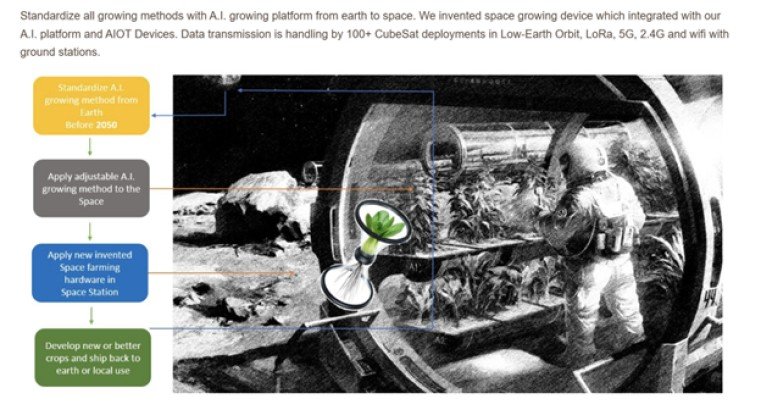AI revolutionizes agriculture: How AI Farm Tech is shaping the future of sustainable farming
06 December 2024


As the global population grows and food demand increases, the agricultural sector is turning to artificial intelligence (AI) to enhance productivity, reduce waste and promote sustainability. Companies like AI Farm Tech, founded by Philip Ng, are at the forefront of this shift, using AI to modernize farming practices.
“We still believe that on Earth we can grow anything, but what about the Moon and Mars? We are preparing to move the whole platform to Mars and the Moon,” said Ng while explaining what his company stands for at the “Global Tech Summit - AI x Future of Communications” session of the Business of IP Asia Forum (BIP Asia).
A key innovation in the AI sector of agriculture is precision farming, which tailors practices to specific field conditions through data collection and analysis. AI Farm Tech’s platform, which leverages satellite imagery, sensor data and weather forecasts, provides farmers with real-time insights to monitor crop health, optimize resource use and improve yields, ultimately reducing costs and environmental impact.
Ng explained to Asia IP that one of the key elements of his approach is minimizing waste through technology. “We directly get the water from the air,” he told Asia IP, highlighting the sustainable methods his company employs.
Founded with the vision of empowering farmers through advanced technology, AI Farm Tech integrates AI into various agricultural processes. Their solutions aim to optimize crop management, improve yield predictions and minimize resource consumption. By leveraging machine learning algorithms and data analytics, the company helps farmers make informed decisions that not only increase productivity but also promote sustainability. The company’s technology helps manage farmland and forests, addressing issues like desertification, land degradation and biodiversity loss. In the face of global challenges such as climate change and food insecurity, this emphasis on sustainability has never been more crucial.
In addition to technological innovation, Ng emphasized the importance of changing public perceptions about AI. “We’re trying to bring in more people; it’s part of our brand to show them that data agriculture is something entirely new – it’s a new job,” he said. He explained that there is a common misconception that AI will replace jobs while, in reality, it can create new opportunities in the sector.
“You’ve got to know what and when, what type of nutrition and at what time, and the right time to apply it. So, AI is nothing on its own, to be honest. It is a decision maker, but if you train it, it’s clever,” said Ng.

Image courtesy of AI Farm Tech’s website
Ng also stressed the importance of adapting farming practices to environmental challenges. “We’re pushing for a controlled environment. Climate change is something we can’t control, but AI can help us adapt,” he explained. He described the company’s innovative concept of a “space tube,” a movable farming system similar to a greenhouse but more flexible in design. “It’s not the same as a traditional greenhouse; we can move it from place to place,” Ng added.
Beyond improving efficiency, AI plays a key role in sustainable agriculture. By optimizing resource use, farmers can lower their environmental impact. AI Farm Tech’s solutions support practices such as crop rotation and cover cropping, which improve soil health, promote biodiversity and sustain long-term land productivity. This shift toward more sustainable practices not only benefits the environment but also aligns with the growing consumer demand for responsibly grown food.
Ng is not the first to realize the potential of AI Agriculture; a report by McKinsey & Company (2021) suggested that AI-powered tools in agriculture can lead to an increase in crop yields by up to 20 to 30 percent and can reduce input costs (fertilizer, pesticides and water) by 10 to 20 percent. These improvements are largely driven by the ability of AI to optimize resource usage, predict optimal harvest times, and monitor crop health.
Another McKinsey & Company report highlighted the value AI can bring to agriculture, with the potential to improve both on-farm economics and broader enterprise operations. Generative AI, in particular, is a powerful tool for processing large, complex datasets – such as geospatial and weather data – to generate actionable insights. These insights help optimize farming inputs, improve labour management and increase crop yields. The integration of analytical and generative AI could unlock up to US$100 billion in on-farm economics and US$150 billion in enterprise operations, based on a McKinsey & Company article in 2020.
Looking ahead, Ng’s vision extends beyond Earth. Alluding to the limitless possibilities for AI-driven agriculture in space. In the face of mounting global challenges, AI Farm Tech’s efforts highlight a future where technology and sustainability go hand in hand, ensuring that agriculture not only thrives but also contributes to a healthier planet for generations to come.
- Cathy Li






